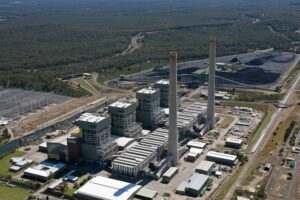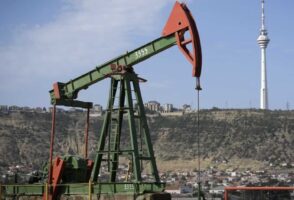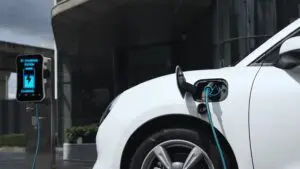“No matter how many times you beat and kick that dead horse, it’s not getting up to plow again.”
Since taking office, President Trump has been checking items off of a coal-industry wish list—ditching the Paris Agreement, stripping environmental safeguards, undermining workplace protections for miners.
While the president’s rhetoric has raised hopes for renaissance of American coal, Trump’s policies have done little to revive the ailing industry.
Experts warn that the administration’s repeated promises to resurrect mining jobs distract from the hard work of rebuilding coal country. Appalachians understand that industry isn’t coming back, but Trump is making it hard for them to move on.
“Promising to bring coal jobs back and repealing environmental regulations at the national level is only harmful to these communities, because it gives them a sense of false hope and it would set them back,” said Sanya Carley, a professor of energy policy at Indiana University and lead author of a new study that examines how Appalachians are coping with coal’s decline.

Over the last three decades, the coal miners have suffered a series of blows, losing more than 100,000 jobs. The biggest hit came during the Reagan years when coal companies started replacing men with machines, allowing them to mine more with fewer workers.
Then, hydraulic fracturing drove downthe price of natural gas, making it cheaper than coal. More recently, the price of wind and solar power has plummeted, dealing another blow to the industry.
Today, coal-fired power plants are shutting down right and left, and there is virtually nowhere in America where it makes sense to build a new coal generator.
Trump can nix every environmental protection on the books. It would do almost nothing to revive jobs. Miners’ biggest foe is, and has always been, the steady march of technological progress.
There is perhaps no better symbol of the industry’s decline than the Kentucky Coal Museum, powered, as it is, by a set of rooftop solar panels.

The death of coal, inevitable though it may be, is a tough pill to swallow in parts of Appalachia, where coal permeates every facet of local life.
“The coal industry sponsors local elementary schools. There are signs all over the place about different coal companies. They pay for sports, and the students wear their logos on their t-shirts,” said Carley.
“We’re told the coal industry goes to high schools and essentially recruits people out of high school and sometimes encourages them to get their GEDs, but other times doesn’t.
So, these students leave high school making $60,000 to $80,000 to $120,000 dollars a year immediately without even needing a college degree.” Today, those jobs are increasingly hard to come by.
Carley and her colleagues at Indiana University heard the same thing again and again in interviews and focus groups across central Appalachia.
“The majority of people that spoke with us said that there was extreme hardship,” said Carley. Respondents were largely unemployed men, many of them former coal miners. No names were listed in the study.

“Coal mining is really a part of the culture here, and it’s interwoven into the way people feel about themselves and their own identity and their identity as a community,” said one respondent.
“And so to lose that so quickly is really — it creates a sense of grief among people about losing their way of life and a piece of their culture that is really engrained and a part of who they are.”
One person, who does job training, talked about his students losing high-paying jobs and struggling to live off unemployment insurance.
“They are about to lose their house, you know, and they are in a really bad place,” said the respondent. “I have seen guys with five-and six hundred dollar truck payments, and I have had guys that had to sell off pretty much everything they owned, just to keep going and get through the program.”
What’s remarkable is that, while people mourn the death of coal, they have little illusion that it will make a comeback.
“I can tell you what my grand-daddy always said, no matter how many times you beat and kick that dead horse, it’s not getting up to plow again,” said one respondent.
And despite their frustration, many have resigned themselves to the task of rebuilding.
“The initial response to this decline in jobs… was at first a great degree of anger and frustration,” Carley said. But that changed.
“A lot of respondents said, ‘Now, we’ve gotten to this point where we’re starting to adapt, and we’re starting to look for new economic opportunities,’” she said, adding,
“There’s a lot of grassroots, on-the-ground work to try to develop new solar fields and put them on old, abandoned coal mines.”
As workers plant new solar farms on fallow mines, former coal workers are retraining for jobs in clean energy.
“Honestly, I think most of them are really excited,” said one respondent of solar trainees.
“You could ask a lot of them, and they’ll say that: ‘Coal is probably not coming back, or if it is, it’s not what it once was, so I’m going to learn as much new and exciting things as I can.
I want to get a degree so I’m more hirable later on.’”

Clean energy cannot replace all lost mining jobs.
While the transition to renewables will likely create more jobs than it eliminates — solar installer and wind turbine technician are the fastest-growing jobs in the country — those jobs will not be concentrated in Appalachia, meaning that if communities in coal country want to survive, they need to look elsewhere for income.
Former coal workers are looking for new opportunities in everything from computer programming to winemaking to tourism.
They would rather reinvent the local economy than leave.
“This is a place where people have such an extremely strong connection to the ground and to history”, said Carley. “People want to stay there, because that is their heart. That’s where they grew up.”
Carley and her colleagues talked to locals in the summer of 2016, before Donald Trump won the presidency on a promise to resurrect coal.
To find out if the election had changed attitudes about the future of the industry, researchers conducted a follow-up survey.
It confirmed their initial results. “By and large, people reported that, on the ground in their communities, the transition had either stayed the same, or it had picked up,” Carley said.
Respondents believe Trump’s policies might slow — but won’t stop — the shift to clean power.
Asked why so many Appalachians supported Trump if they believe coal is beyond rescue, Carley said, “If somebody’s going to tell them that they’ll bring back their jobs, then it makes sense for them to act in their best interest,” adding, “As to whether or not they truly believe that, I do not get the impression that they do.”
The people she interviewed regarded Trump and his most ardent supporters with some skepticism.

“They want to elect politicians that are falsely promising them, ‘I’m gonna bring coal back. I’m gonna make West Virginia great again,’” said one respondent. “The coal jobs aren’t coming back. Coal is dead.”
Many respondents welcomed the the death of an industry that has killed and maimed miners, polluted waters and destroyed landscapes.
Carley said the drive for reinvention was coming from a growing number of young people, would-be miners willing to stray from the path so well trod by their fathers and grandfathers.
“I think slowly but surely, you kind of go through all these stages of mourning,” said one respondent. “So, there’s still those that think coal will come back.
But there’s — more than ever in my lifetime — many that say it’s not coming back, at least not how it was, and so there is definitely more among the younger than among the older, but there is kind of this excitement and possibility that now coal is gone and we can rebuild our economy into what we want.”
Jeremy Deaton writes for Nexus Media, a syndicated newswire covering climate, energy, policy, art and culture.
Source: Nexus Media. Reproduced with permission.










